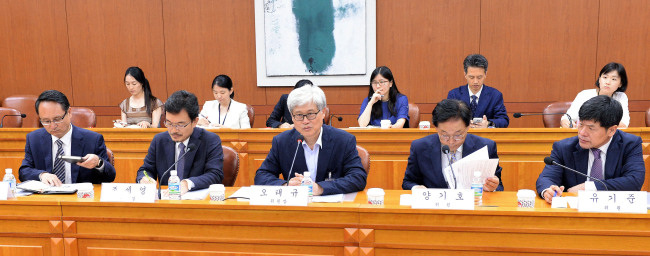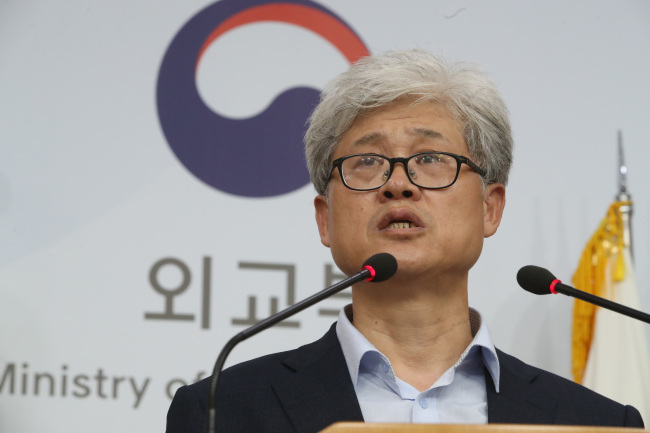Task force vows ‘victim-oriented’ approach to sex slavery deal
By Shin Hyon-heePublished : July 31, 2017 - 18:14
Seoul’s Foreign Ministry on Monday launched a public-private task force to review a 2015 settlement on Japan’s sexual enslavement of Korean women during World War II, pledging a “victim-oriented” approach and fair reports free from political influence.
The panel, chaired by former journalist Oh Tai-kyu and consisting of eight other public officials and private experts, held its first meeting after being appointed by Foreign Minister Kang Kyung-wha earlier in the day.
The panel, chaired by former journalist Oh Tai-kyu and consisting of eight other public officials and private experts, held its first meeting after being appointed by Foreign Minister Kang Kyung-wha earlier in the day.

The team is tasked with looking into the yearslong negotiations and related procedures in the run-up to and after the surprise announcement of the accord on Dec. 28, 2015, through paper reviews and interviews of victims and other stakeholders. It aims to wrap up the works and unveil the results within this year.
“It is a reality that most of our people and some comfort women victims cannot accept the agreement,” Oh said at a news conference.
“From the perspectives of international law or human rights norms, it is common sense to take a victim-oriented approach to the matters of human rights. ... There is substantial resistance among some victims in terms of quality of the agreement, so we will see why it is and whether their thoughts have been sufficiently taken into account before the announcement.”
The launch was in line with President Moon Jae-in’s election pledge to revisit the deal, which drew heated backlash from some victims, civic groups and many ordinary South Koreans due chiefly to the former Park Geun-hye administration’s failure to consult in advance with the victims.
The accord brought a turnaround in the checkered relationship following years of bitter spats over historical and territorial issues, which had for decades plagued increasingly crucial economic and security cooperation between the two countries.
Under the plan, Japanese Prime Minister Shinzo Abe acknowledged the government’s responsibility for the atrocities, offered an apology and vowed 1 billion yen ($9 million) from state coffers to help set up a fund for the victims in Seoul.
But it instantly sparked protest from the public and opposition parties. Among the controversial elements were clauses saying the settlement is of a “final and irreversible” nature and another that implies the removal of a statue erected in front of the Japanese Embassy here by civic groups to honor the women.

The task force’s findings and the Moon administration’s ensuing steps would bring a sweeping impact to the bilateral relations, with Tokyo calling for Seoul to respect and abide by the deal as a state-to-state promise.
Though he floated a renegotiation on the campaign trail, Moon has not made his policy option clear since taking office in May.
Oh said the task force is setting out its activities without assumptions as to the results, noting it has not decided whether to insert policy recommendations to its final report to be summited to Kang.
By Shin Hyon-hee (heeshin@heraldcorp.com)








![[Graphic News] More Koreans say they plan long-distance trips this year](http://res.heraldm.com/phpwas/restmb_idxmake.php?idx=644&simg=/content/image/2024/04/17/20240417050828_0.gif&u=)
![[KH Explains] Hyundai's full hybrid edge to pay off amid slow transition to pure EVs](http://res.heraldm.com/phpwas/restmb_idxmake.php?idx=644&simg=/content/image/2024/04/18/20240418050645_0.jpg&u=20240419100350)





![[From the Scene] Monks, Buddhists hail return of remains of Buddhas](http://res.heraldm.com/phpwas/restmb_idxmake.php?idx=652&simg=/content/image/2024/04/19/20240419050617_0.jpg&u=20240419175937)

![[KH Explains] Hyundai's full hybrid edge to pay off amid slow transition to pure EVs](http://res.heraldm.com/phpwas/restmb_idxmake.php?idx=652&simg=/content/image/2024/04/18/20240418050645_0.jpg&u=20240419100350)

![[Today’s K-pop] Illit drops debut single remix](http://res.heraldm.com/phpwas/restmb_idxmake.php?idx=642&simg=/content/image/2024/04/19/20240419050612_0.jpg&u=)